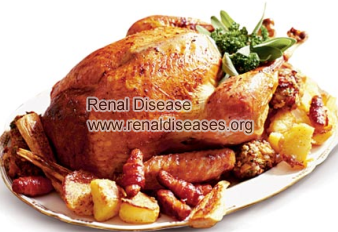Whatsapp: +8615512139310
- Email us:
 It is a common sense that CKD Stage 3 kidney disease should have diet limitation in order to control the illness condition. Well then, is turkey good for them? Let’s see it in this article.
It is a common sense that CKD Stage 3 kidney disease should have diet limitation in order to control the illness condition. Well then, is turkey good for them? Let’s see it in this article.
Turkey is a popular food in western countries due to its delicious taste and rich nutrition. In fact, turkey is not a forbidden for stage 3 kidney disease patients, but the intake should be limited on the basis of own illness condition.
Turkey is a food which is low in fat and high in protein. And it is a good source of iron, zinc, phosphorus, potassium and vitamins B and so on. It has become a favorite of those on low-fat diets, along with chicken. The healthy benefits are as below.
-Keep potassium and sodium balance
-relieve swelling
-enhance immunity
-reduce high blood pressure
-ease anemia
-strengthen blood vessels
-maintain the cell’s stability.
It is suitable for the people with low immune, poor memory, anemia, swelling, and so on. In view of these points, Stage 3 kidney disease can eat turkey in order to control these clinical symptoms.
Although it has so many benefits, what I want to emphasize is that patients with kidney disease should limit intake of this food. Because it contains a large amount of protein. Eating too much protein will excess much urea nitrogen which should be filtered by the kidneys and increase the kidney’s burden and cause the further kidney damage. Then, how can you consume protein?
Frankly speaking, protein supplement for healthy individuals is 0.6 to 0.8g/kg.d. If the patients suffer from heavy proteinuria, the intake of proteins should meet the protein loss from their urine. When the patient is on dialysis, generally it is recommended that daily protein consumption should be increased to 1.2 to 1.5g/kg.d. The patients in different developing stages of kidney disease need to make sure of the suitable amount of protein they can eat based on their real condition, and if they eat turkeys the consumption should not exceed the limited range for their own health.
More detailed info about friendly-renal diet, please talk with our online doctors or leave a message below directly.